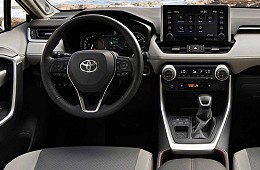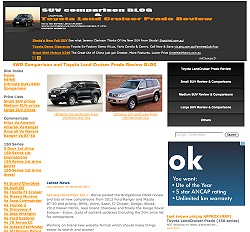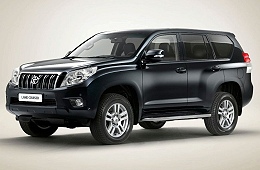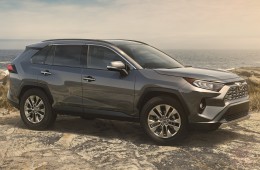|
|
VS |
|
This is the new Toyota RAV4 vs Hyundai Tucson comparison for 2019. With the release of the all new RAV4 we decided to do a comparison against the Hyundai Tucson, one of the better sellers in the current small-medium SUV segment. However the Tucson is not a favourite as it only has one thing going for it and that’s is exterior design. Bear in mind that the market positioning for Hyundai is directly against the Toyota equilivent. Read on.
Toyota RAV4 vs Hyundai Tucson exterior design : It mostly near to compare a newly released model against one that has been for sale of over 3 years especially in the exterior looks department. Thankfully the Tucson design has stood the test of this relative short time and does look like a current design. However that is only when compared to exisiting and more conservatively design model. Top range Tucson do look more upmarket than base models at least until you drive one. The RAV4 look like a more modern design and certainly has nicer paint quality.
Toyota RAV4 vs Hyundai Tucson interior: The interior of the Tucson was always best described as nice with class average materials, look and feel. However in comparison is lacking against the RAV4 which not only looks different but nicer at the same time. That said Tucson interior has been updated with a re-skinned dashboard top to keep up with the competition and its a good effort. However it does reveal that Hyundai deliberately designs it’s interior for the price point and current competition. In terms of size the Tucson is smaller and it is noticeable.
Toyota RAV4 vs Hyundai Tucson engines and technology: Once again it is no secret Hyundai does not ‘do’ state of the art technology, using older but refined engines and designs. The Hyundai’s body construction for example is overweight for a smaller design indicating less than premium steel and design technology. The engines are good for it’s age but certainly not up to the power output or efficiency of the latest equivalent Toyota engine. Safety systems in the Tucson is very good with as many features including Auto emergency brakes. Complete with a nice ‘Infinity’ branded sounding stereo in most models it’s a great package. The Tucson also has the option of a diesel engine which is not found in too many competitors while it has the torque advantage over the all the others but not the fuel efficiency. The RAV4 has everything the Tucson has an more with the option of the Hybrid engine at no price premium makes it always worth a comparison.
The conclusion to the new Toyota RAV4 vs Hyundai Tucson comparison is simple: The new RAV4 is the better buy on the spec sheet for the engine, space and safety feature thanks to a lower price points. Some will say the the availability of a diesel engine makes the Tucson a winner until they realise that the turbo lag, extra noise, price of diesel and extra services for the filter and cost of actually buying 0is annoying – that applies to every modern diesel engine.
| Toyota RAV4 | Hyundai Tucson |
 |
 |
| Engines | |
| 4 Cylinder Petrol 2 Litre (1987cc) 91 Octane DOHC EFI VVT Claimed 127Kw @ 6600RPM Claimed 203Nm @ 4400RPM |
IL4 cylinder Petrol Turbo DOHC DI EFI VVT 1.6 Litre (1591cc) Claimed 130Kw @ 5500RPM Claimed 265Nm @ 1500RPM |
| 4 Cylinder Petrol 2.5 Litre (2487cc) DOHC EFI VVT Claimed 152Kw @ 6600RPM Claimed 243Nm @ 4000RPM |
IL4 Cylinder Petrol 2 Litre (1999cc) DOHC EFI VVT Claimed 114Kw @ 6200RPM Claimed 192Nm @ 4000RPM |
| 4 Cylinder Petrol Hybrid 2.5 Litre (2487cc) DOHC EFI VVT Claimed 163Kw @ 4000RPM Claimed 221Nm @ 3600RPM |
IL4 Cylinder Diesel 2.0 Litre (1995cc) DI Turbo DOHC EFI Claimed 136Kw @ 4000RPM Claimed 400Nm @ 1750RPM |
| Weight | |
| Kerb weight FROM 1515Kg Towing capacity up to 1500kg *Dependimg on engine type |
Kerb weight FROM 1556Kg Towing capacity up to 1600Kg |
| Fuel capacity & consumption | |
| Up to 55 litres IL4 2.0 litre Petrol 6.8 litres per 100km IL4 2.5 litre Petrol 7.3 litres per 100km IL4 2.5 litre Hybrid 4.8 litres per 100km |
Up to 62 litres IL4 1.6 Turbo Petrol 7.7 litres per 100km IL4 2.0 Petrol 7.9 litres per 100km IL4 2.0 Turbo Diesel 6.8 litres per 100km |
| Other specifications | |
| 6 speed Auto/manual or CVT Auto Overall height/width 1685/1865 Overall length/wheelbase 4615/2690 4WD system: 2WD or AWD ANCAP Safety: 5/5 |
6 speed Auto/manual and 7 speed Auto Overall height/width 1660/1850 Overall length/wheelbase 4475/2670 4WD system: On demand AWD or 2WD ANCAP Safety: 5/5 Tyre size: 245-45-19 or 225-60-17 |
| Capability | |
| Angle of: (degrees) Approach xx Departure xx Breakover xx Ground clearance (unloaded) 188mm Water Fording depth xxmm Max |
Angle of: (degrees) Approach xx Departure xx Breakover xx Ground clearance (unloaded) xxxmm Water Fording depth xxmm Max |
| Performance | |
| Pricing | |
| 2020 FROM $30,640 – 47,140 AUD *Always check with the dealer for up to date pricing, specifications, on-road costs, accessories and specials etc.. everything as usual is subject to change! |
2019 $28,990 – 51,005 AUD 2017 $27,990 – 47,490 AUD *Always check with the dealer for up to date pricing, specifications, on-road costs, accessories and specials etc.. everything as usual is subject to change! |





